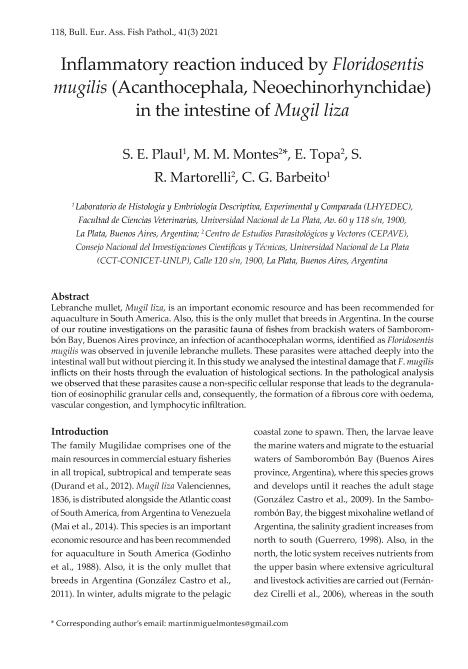Artículo
Inflammatory reaction induced by Floridosentis mugilis (Acanthocephala, Neoechinorhynchidae) in the intestine of Mugil liza
Plaul, Silvia Elena; Montes, Martin Miguel ; Topa, Pascual Emilio
; Topa, Pascual Emilio ; Martorelli, Sergio Roberto
; Martorelli, Sergio Roberto ; Barbeito, Claudio Gustavo
; Barbeito, Claudio Gustavo
 ; Topa, Pascual Emilio
; Topa, Pascual Emilio ; Martorelli, Sergio Roberto
; Martorelli, Sergio Roberto ; Barbeito, Claudio Gustavo
; Barbeito, Claudio Gustavo
Fecha de publicación:
04/2021
Editorial:
European Association of Fish Pathologists
Revista:
Bulletin of the European Association of Fish Pathologists
ISSN:
0108-0288
Idioma:
Inglés
Tipo de recurso:
Artículo publicado
Clasificación temática:
Resumen
Lebranche mullet, Mugil liza, is an important economic resource and has been recommended for aquaculture in South America. Also, this is the only mullet that breeds in Argentina. In the course of our routine investigations on the parasitic fauna of fishes from brackish waters of Samborombón Bay, Buenos Aires province, an infection of acanthocephalan worms, identified as Floridosentis mugilis was observed in juvenile lebranche mullets. These parasites were attached deeply into the intestinal wall but without piercing it. In this study we analysed the intestinal damage that F. mugilis inflicts on their hosts through the evaluation of histological sections. In the pathological analysis we observed that these parasites cause a non-specific cellular response that leads to the degranulation of eosinophilic granular cells and, consequently, the formation of a fibrous core with oedema, vascular congestion, and lymphocytic infiltration.
Palabras clave:
Mugil liza
,
Patologia
,
Acantocefalo
,
Floridosentis
Archivos asociados
Licencia
Identificadores
Colecciones
Articulos(CEPAVE)
Articulos de CENTRO DE EST.PARASITOL.Y DE VECTORES (I)
Articulos de CENTRO DE EST.PARASITOL.Y DE VECTORES (I)
Citación
Plaul, Silvia Elena; Montes, Martin Miguel; Topa, Pascual Emilio; Martorelli, Sergio Roberto; Barbeito, Claudio Gustavo; Inflammatory reaction induced by Floridosentis mugilis (Acanthocephala, Neoechinorhynchidae) in the intestine of Mugil liza; European Association of Fish Pathologists; Bulletin of the European Association of Fish Pathologists; 41; 3; 4-2021; 118-127
Compartir



